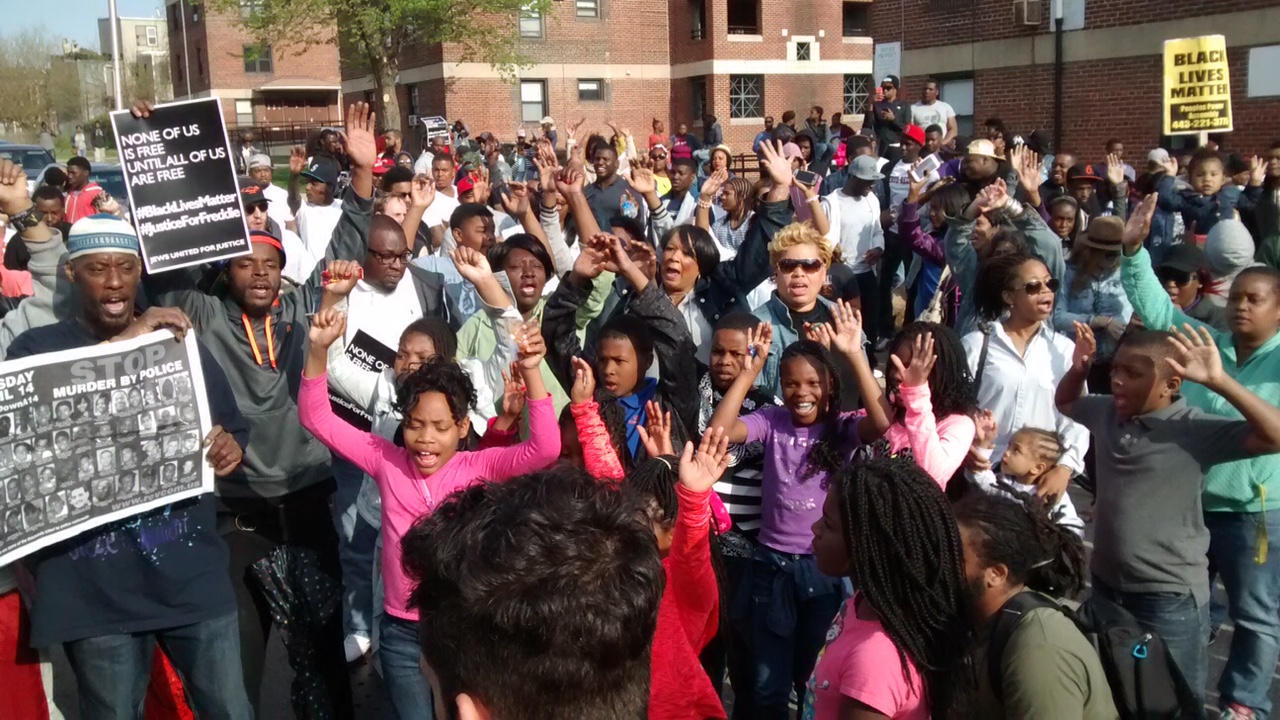United States
Outrage swells in Baltimore’s streets following death of Freddie Gray
25/04/2015 There is a new feeling in Baltimore, where once deserted streets are now filled with protestors who call for “Justice for Freddie Gray.”

While demonstrations have been peaceful, the protestors’ outrage is palpable, shown by the growing number of participants–swelling at times to the thousands–and unrelenting protests held every day and night since Freddie Gray’s death was announced on April 19th. Meanwhile, the police’s attempts to break up the protests have led to some minor scuffles, during which several protestors have been arrested and released with citations and threats against their continued participation.
On April 12, 25 year-old Freddie Gray caught the eye of a police officer a few blocks from his home. Within moments, he was chased down, tackled to the ground, and arrested. Bystanders’ video footage captured police officers dragging Gray into a van, body limp and legs contorted as he cried out in pain. The details of what happened inside the van have not been released. Almost an hour later, an ambulance transported Gray to a hospital, where he was treated for severe spinal cord injuries. Gray later lapsed into a coma and died within a week. Baltimore police have yet to explain the reasons behind his arrest.
The chilling sounds of Freddie Gray’s cries of pain, are shockingly reminiscent of those of Eric Garner, who was choked to death by NYPD officer Daniel Pantaleo in Staten Island, New York on July 17, 2014. According to a witness, Gray also cried out “I can’t breathe!” in the last moments of his life. These three words have become one of the poignant rallying calls adapted by the growing Black Lives Matter movement.
The illusion being rammed down the public’s throat is that this is an exceptional case. Mayor Stephanie Rawlings-Blake and Baltimore Police Commissioner Anthony W. Batts have appeared multiple times in front of cameras, apparently shocked and indignant at yet another incident of police brutality that occurred on their watch. Their words — empty condolences and promises for investigation — ring empty to the tens of thousands of men and women of color in Baltimore who witness the repeated impunity of the police every day. After several days of public outcry, Commissioner Batts gently reprimanded the officers for being too slow to respond: “Our police employees failed to get him medical attention in a timely manner.”
But was Freddie Gray’s senseless death caused by a few bad apples in the police force? The answer is a resounding no. The loss of life in black and brown ghettos is not accidental. It’s systemic. The case of Freddie Gray is just one example of an almost everyday occurrence in Baltimore’s poor, majority-black neighborhoods. Repeated reports of abuse perpetrated by police have emerged from the most economically depressed areas. The city government has refused to count the numbers of men and women of color killed by the police but we do know that since 2011, there have been over 100 lawsuits against the city for police brutality and misconduct.
The social discontent simmering in communities of color necessitates police brutality, a key element of state repression. Racial and ethnic segregation play key roles in portraying minorities as “dangerous” subjects. In poor, black communities, police violence and impunity are intrinsic and deliberately upheld by the broader legal apparatus.
Minor offenses like loitering and drinking in public are met with unchecked violence and a staggering number of arrests. The people of targeted communities carry a deep distrust of the police, who are seen as harassers and state-sanctioned thugs, rather than sources of protection or safety.
There has been a powerful response to Freddie Gray’s death, with thousands taking part in demonstrations over the past week. These actions have won national and international attention for the many victims of police violence in Baltimore. So far, protests have been spontaneous and markedly grassroots. Unfortunately, some religious leaders have taken front-and-center, propagating slogans like “we want peace,” “the answer comes from God,“ and “we surrender.“ This pacifying discourse is at odds with the combative spirit of the protests, and the overwhelming feeling of outrage within the community.
In order to achieve justice for Freddie Gray and an end to police harassment and brutality, we must coordinate our efforts. We must unite communities of color, the poor, and the workers of Baltimore to build the growing protests into a powerful movement for justice in Baltimore and throughout the country.







